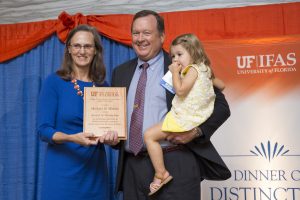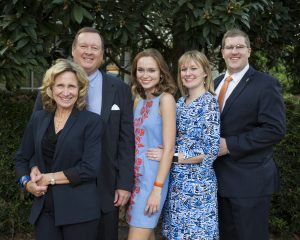Michael Minton, an alumnus from the UF/IFAS College of Agricultural and Life Sciences (CALS), is a lawyer at Dean, Mead, Egerton, Bloodworth, Capouano & Bozarth, P.A. Minton is the past president of the firm and currently serves as the Chair of Dean Mead’s Agribusiness and Solar and Renewable Energy Industry Teams. As a triple Gator, Minton earned his bachelor’s degree in food and resource economics in 1979, his Juris Doctor (J.D.) in 1981, and a Master of Law in Taxation in 1982.

He has served Florida’s generationally owned agricultural businesses for over 40 years. His focuses primarily include agribusiness, tax, and water law. Some of his services include negotiating conservation easements, business succession planning, and tax planning.
In September, Minton was recognized as the 2023-2024 Gerald T. Hart Outstanding Tax Attorney of the Year. The Florida Bar Tax Section honors the professional who has made major contributions to tax law practices and upholds the highest standards of competence and integrity.
What brought you to the University of Florida?
While I did consider other colleges in the southeast, the University of Florida (UF) has been a part of my family heritage for many generations. My parents met at UF, and my grandmother was fond of recalling that she got her teaching degree from the East Florida Seminary (predecessor of U.F. in the early 1900’s). We have since had three generations attend and graduate from UF.
What made you interested in food and resource economics (FRE)?
What better major than one that combines both the opportunity to take business classes from the business school, including both accounting and economics, and the agriculture classes one needs to work within the agriculture community and industry. FRE was the perfect mix for me. There were a number of us that took FRE as our major but also went to many classes at the business school. We did quite well, often times setting the curve when it came time for finals.

Were there any faculty members who helped shape your CALS experience?
One of the courses I took while in the FRE program was the agricultural law course taught by Professor James Wershow. This was the first truly Socratic method teaching course I have ever experienced, and I found it quite intellectually stimulating and challenging. Professor Wershow (who was the father of the Greenbelt Law in Florida), was also extremely well connected politically in Tallahassee. The field trips we took while in his class were very informative and helped establish relationships that were very beneficial to my practice in later years.
Following that experience with Dr. Wershow, I decided to attend UF Law School. There I met Professor Jack Freeland, who was the director of the graduate tax program. Professor Freeland also became a mentor and close friend and counseled me through law school into the graduate tax program. After I received my JD in 1981, I received my LLM in Tax from U.F. in 1982 and it propelled me into the job opportunity at Dean Mead. I have been with Dean Mead my entire career.
What were you involved in during your time as a CALS student?
I pledged the Alpha Tau Omega Fraternity my freshman year in 1975 and enjoyed many years of active membership while at UF until 1982. In addition, I participated in the Golden Key Honor Society and played on the Citrus Club softball team.
Did you complete any internships as a CALS student?
Professor Wershow offered me the opportunity to be one of his research assistants, which was an actual paid position. For much of my junior and senior years, I served in that role providing research material and drafting memoranda to him that he utilized for his courses and for his work on behalf of Florida agriculture. It was a very instrumental part in helping me develop my skills to write accurately and succinctly. I also learned how to research in the law library, all of which were skills I used while I attended Law School.
Is there anything you would do differently?
I started in the Fall of 1975 and completed 8 years of education in 7 years, graduating in the summer of 1982. At the time it seemed like the right thing to do; to matriculate as soon as possible and become gainfully employed, but in retrospect I do not know why I was in such a big hurry. As my father used to say, “Son, you’d still be at U.F. if you hadn’t run out of degrees and had to get a job.”
What is one thing you know now that you wish you would have known when you were in school?
I believe I knew this in school, but I never appreciated the importance of it until later, which is the time and effort it takes to develop and nurture relationships with your classmates, peers and those that will be related to your professional career. While in school I developed life-long friendships, but I had never appreciated at that time how important those friendships were going to become, not just personally but also professionally. They have meant so much to my career and have created so many opportunities for me and my family professionally and personally. It takes time and effort to develop, nurture and maintain those relationships, but it is well worth it.
What advice would you give to a CALS student?
Enjoy and participate in all the opportunities provided you while you are at school at CALS. It is a great foundation upon which you can build for anything you wish to do in life.
 0
0
